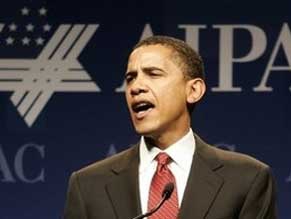|
World Jewish News

Photo by haaretz.com
|
U.S.-Israel row clouds opening day of AIPAC conference
22.03.2010, Israel and the World Barbara Isaacson, 78, took the overnight train from Massachusetts to make it on time to the opening of the annual AIPAC conference in Washington. At one time she fought to gain exit visas for Jewish Prisoners of Zion in the Soviet Union, but now too she admits that the struggle goes on.
She is writing letters to President Barack Obama, asking him to deal fairly with Israel and telling him that Jerusalem is not up for negotiation.
The crisis Israel-U.S. relations underwent during the past week, did not leave her indifferent.
"Our vice president, [Joe] Biden, was wrong," she says. "They should not have said that it was an insult. Israel showed great restraint. Israel is an amazing country that is giving us pride and it should not have to build bomb shelters in Sderot instead of playgrounds. I came to this conference so that Israel will know that in America there are those who dedicated their whole life to it, even though my five children live in the United States."
On the steps of the conference center in Washington, Barbara is ready to enter a new battle: now against a group of demonstrators wearing t-shirts with Palestinian flags, protesting against an "apartheid state."
During the exchange of words, it turns out that the mother of one of the demonstrators is Jewish.
"So you are Jewish!," Barbara declares victoriously. "May God bless you and lead you to und rstand how wrong you are!"
Protesters in front of the conference center put up signs in favor and against. Boris Zelkin puts up signs saying "Bibi - You are a Leader! Bibi, We believe in you!" and complains that he has been driven away from a number of places and has not been permitted to demonstrate inside the hall.
"I came to tell the American Jews too that if they want to be multicultural and tolerant, then I don't - I want to be Jewish," he says.
Several meters away stands Bill Perry, a Vietnam veteran whose wounds left him disabled. He is holding up a sign which says "AIPAC bought the Congress and the Senate."
"It is embarrassing for how little our politicians can be bought," he declares. "This is the first time I came to demonstrate. It just makes me laugh, the 'conflict' between Israel and Washington. There was no conflict. Israel will continue its apartheid policy."
On the face of it, opening day at the American Israel Public Affairs Committee Conference was business as usual. Congressmen and Senators complimented Israel, spoke of the strong bonds between Israel and the United States, historical moments of meetings between the leaders of the two countries were broadcast on a large screen, along with shots of new immigrants and IDF soldiers.
The hallways were decorated with the photographs of the major donors and activists of the organization, with their comments on why they support AIPAC.
In various halls there were lobbying seminars, for beginners and advanced, discussions on Syria, Iran, Turkey, Latin America, and meals accompanied by discussions, including a meeting with young African-Americans whose generation does not really know the role that American Jews played in the civil rights movement of the 1960s.
Even the competition with the new Israel lobby group on the left, J Street, did not succeed in shaking the standing of AIPAC, at least in terms of the numbers of participants, with 7,500 people signing up, a record high for the group.
But the week of friction between Jerusalem and Washington has left a bitter taste in the mouths of many veteran activists.
"I would not say that I am disappointed by the Netanyahu government," says Donell Weinkopf from New York. "But I feel like shit. Israel did something stupid by declaring this construction. I am not concerned about he future of the relationship because I think that the shared values and interests still stand, and that this was genuinely an 'accident inside the family,' but I think that the time has come for Israel to stop biting the hand of a friend."
Rabbi Yossi Lipsky from Massachusetts says he thinks the current discord will leave a "minor scar."
"People in the community were disappointed by the disproportionate response from America to what, in the worst case scenario, was bad timing," he says. "In the agreements with the Americans there was no mention of freeze in East Jerusalem. But because this response had no basis and made no sense, I am optimistic that it will pass. Now both sides are doing the right thing - they are trying to fix things quietly, diplomatically. I hope that they will focus on the fact that Israel made unprecedented concessions without seeing any return from the other side."
Seymour Krinsky from Kansas is worried by the reception that Secretary of State Hillary Clinton will receive this morning.
"I am making an effort so that people will behave toward her with civility," he says using the Hebrew words derekh eretz, "and that they will remember that she is a guest in spite the things she said recently. There were many interpretations in the press. I hope that they were mistaken, that she said different things."
AIPAC meanwhile is trying to renew its power base and bring in fresh supporters. This year, in addition to using Twitter and YouTube, some 1,300 young activists and students are taking part.
For many of them, immigrating to Israel is not part of their immediate plans. "We were never exposed to anti-Semitism, but we heard about anti-Israel campaigns in colleges, and next year we are going to college, and we want to have the tools to deal with that," one said.
Haaretz.com
|
|
